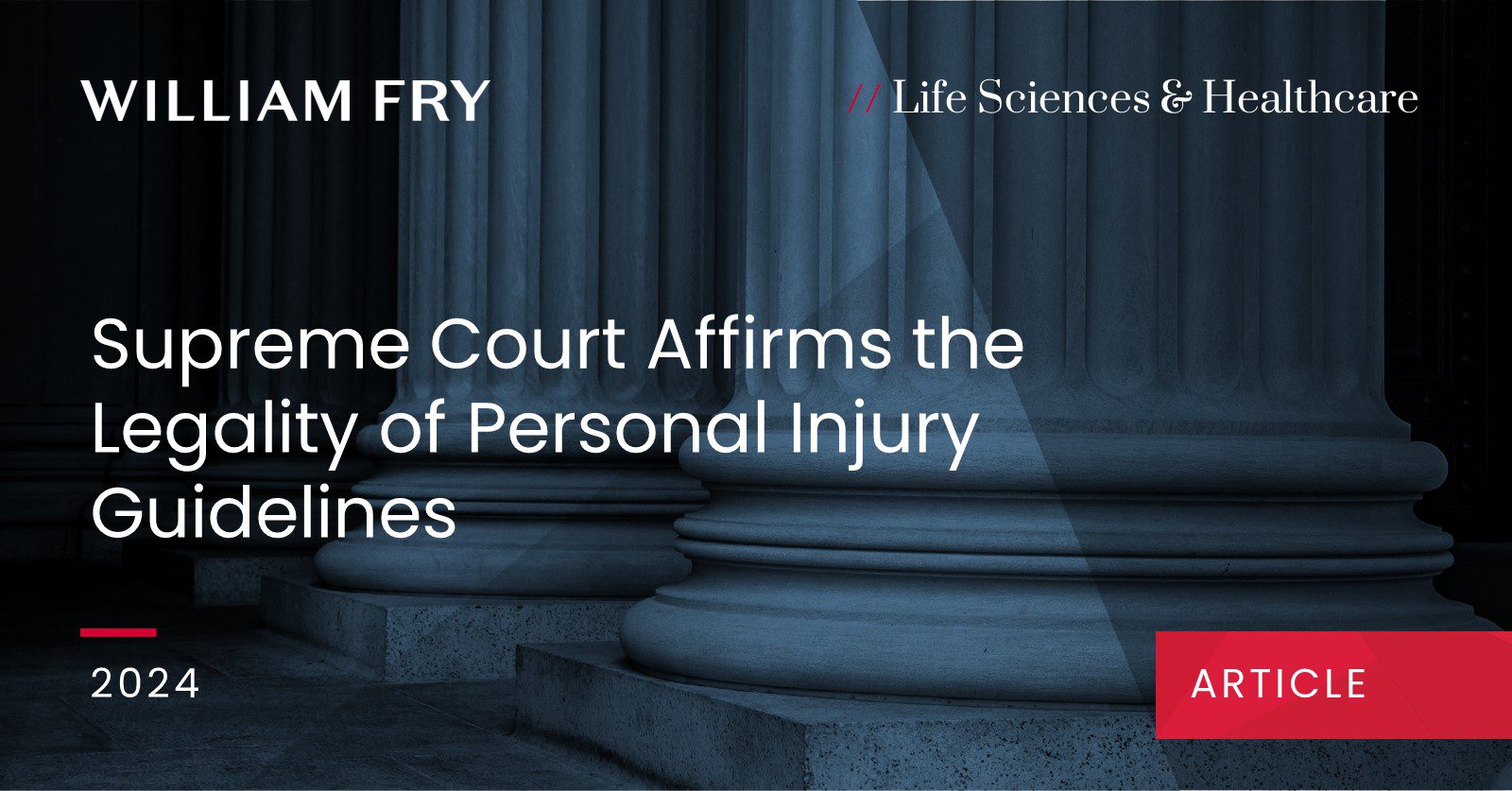The Supreme Court in Delaney v The Personal Injuries Board & Ors, has confirmed the validity and continued operation of Personal Injury Guidelines (Guidelines) which were passed by the Judicial Council on 6 March 2021 and came into operation on 24 April 2021.
Listen to our Legal News Podcast where Tara Rush and Gail Nohilly from our Knowledge department discuss a recent Supreme Court Decision looking at personal injury guidelines which have resulted in sizeable reductions in assessments, described as “a radical top-down recalibration of general damages for pain and suffering”.
The Guidelines replace the Book of Quantum which contained general guidelines for assessing damages awards for personal injuries. Membership of the Judicial Council is comprised of judges, which was a key issue in this case.
The legislation underpinning the Guidelines includes the Judicial Council Act 2019 (2019 Act). Section 7(2)(g) and section 90 empower the Judicial Council to adopt personal injury award guidelines. The Personal Injuries Assessment Board (PIAB), now the Injuries Resolution Board, and a court, in assessing damages in a personal injury action with effect from 24 April 2021, must have regard to the Guidelines and must give reasons if it departs from them.
Background
On 12 April 2019, Ms Delaney sustained injuries to her knee and fractured a small bone in her ankle, after tripping on an allegedly defective footpath. She had to wear a medical boot for a month, and the prognosis was that she would have swelling in her ankle for approximately six to nine months. Her orthopaedic surgeon advised that she would have no significant long-term injuries. In May 2019, Ms Delaney submitted a personal injury claim to PIAB alleging negligence against the local authority. Her application was not determined when the Judicial Council adopted the Guidelines under section 7(2)(g) of the 2019 Act. This meant that PIAB, in assessing the claim had to have regard to the Guidelines then in force, rather than the previous Book of Quantum.
Ms Delaney’s claim was ultimately assessed in May 2021 at €3,000 having regard to the Guidelines. Ms Delaney refused the assessment and instituted proceedings before the courts, which remain outstanding. It was not disputed that if her claim was assessed under the Book of Quantum, she would have been awarded a significantly higher sum than €3,000 for general damages.
The Constitutional Challenge
Ms Delaney instituted judicial review proceedings against PIAB and various other state defendants including the Judicial Council, challenging the legality of the Guidelines and the constitutional validity of the legislation under which they were adopted. In particular, she alleged that the Guidelines are an impermissible delegation of legislative power to the Judicial Council, that the provisions giving legal effect to the Guidelines offend the constitutional provisions on judicial independence, the imposition of the Guidelines is retrospective and deprived her of her vested rights and are an infringement of her property and personal rights.
As against PIAB, she contended that PIAB erred in assessing her claim by reference to the Guidelines, and ought to have assessed it by reference to the Book of Quantum.
The High Court dismissed Ms Delaney’s claim. There followed an appeal to the Supreme Court (Court) which was heard by seven members of the Court over a number of days in February and March 2024.
The Appeal
Five judgments were delivered by the Court in Ms Delaney’s case, which Charleton J described as being of “systemic importance”. The decision will influence thousands of similar cases awaiting judicial determination, and all subsequent personal injury proceedings. Although the judgments are complex and thorough, the following is a high-level summary of the key findings of the majority of the Court:
- The Guidelines are legally binding and are of normative effect, and should only be departed from where there is no reasonable proportion between them and the award that should be made.
- The Guidelines, passed by the Judicial Council on 6 March 2021, and adopted on 24 April 2021, are in force as a matter of law and have legal effect.
- Ms Delaney had no vested property or personal right to have her case adjudicated by PIAB under any guidelines other than those passed by the Judicial Council in March 2021 and adopted in April 2021.
Section 7(2)(g) of the 2019 Act
Ms Delaney contended that what the Judicial Council was mandated to do under section 7(2)(g) of the 2019 Act was an interference with the independence of the judiciary. She submitted that the 2019 Act mandated the Judicial Council (comprised of judges) to adopt the Guidelines, to which the judges are then bound when exercising their judicial functions, and is therefore a direct conflict with the principle of judicial independence.
The Court agreed, and by majority decision found that because the Guidelines are binding and have a normative effect, then the statutory foundation for making those Guidelines i.e., section 7(2)(g) of the 2019 Act in its current form, is unconstitutional because it is contrary to the judicial independence protected by the Constitution. The decisive factor, as pointed out by Faherty J, was the mandatory nature of section 7(2)(g): the effective “conscription” of the entire judiciary to effect a change to the law.
Conclusion
Since their introduction, the Guidelines have resulted in sizeable reductions in assessments, described by Haughton J as “a radical top-down recalibration of general damages for pain and suffering”.
The effect of this decision is significant. In confirming the legality of the Guidelines, the decision brings with it legal certainty and predictability for those involved in prosecuting or defending personal injury proceedings. As regards the unconstitutionality of section 7(2)(g), the Minister for Justice has committed to bring forward the necessary amending legislation.
As for Ms Delaney’s pending personal injury case, should it proceed, the trial judge must have regard to the Guidelines – except where the award under the Guidelines bears no reasonable proportion to that which the trial judge believes should be issued.
We will continue to keep you apprised of developments in this area, but should you wish to discuss the Guidelines or any aspect of this article, please reach out to Mary Cooney or any member of our Healthcare team.
Contributed by Eleanor Bradford Gail Nohilly.


